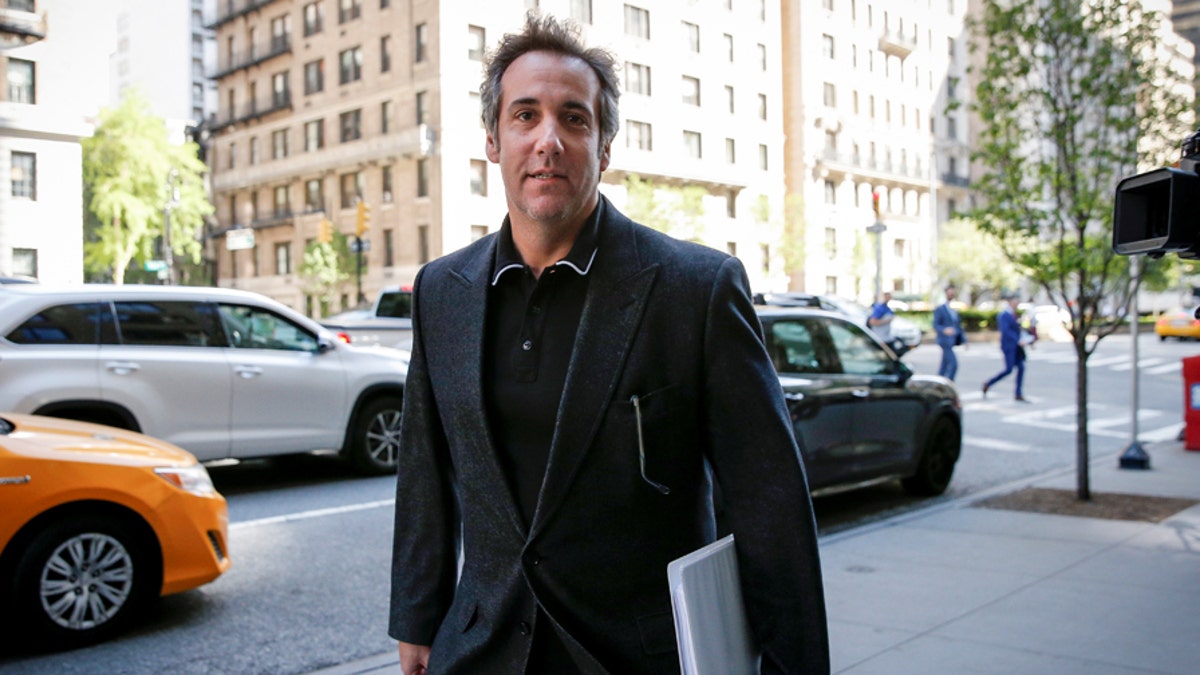
Former Trump Organization attorney Michael Cohen is facing scrutiny from federal investigators over his financial transactions. (Reuters)
It's quite obvious that Michael Cohen was sending a sharp message when he sat down with ABC's George Stephanopoulos.
What is less apparent is how deliberate and carefully crafted his words were, especially on subjects that don't directly involve him, and his strategy toward the intended recipient: President Trump.
Based on my reporting, the president's former personal lawyer was not only issuing a declaration of independence from his longtime boss, he was telling the world that he doesn't agree with some of Trump’s core positions.
And the phrases were carefully rehearsed as a finger-in-the-eye shot at Trump, not just to calmly convey that he will not be a "punching bag" or cast as a "villain" as "part of anyone's defense strategy."
Cohen has dual goals. Having become a key figure in a federal investigation, he is trying to better position himself to make a deal if in fact he winds up facing criminal charges. And he is taking the first step toward restoring his battered reputation in the court of public opinion.
On a personal level, I'm told, Cohen at times has been angry and depressed over being drawn into the Robert Mueller probe because of his past service to Trump. But he has felt relieved since the ABC sitdown made headlines, believing that he can redeem himself only if he is not viewed as a blind Trump supporter.
Cohen is not proud of some of what he's done for Trump in the past, I'm told, but made his judgments at the time and believes some of the current criticism is based on 20/20 hindsight.
The New York lawyer, often dubbed Trump's "fixer," recently parted company with his attorneys and hired former prosecutor Guy Petrillo and former Clinton White House lawyer Lanny Davis.
One major clue to the interview, based on my reporting, is in Cohen's answers involving the president's ongoing battles with law-enforcement officials and the intelligence community, and even his foreign policy.
These are far afield from the subjects that Cohen has generally discussed in the past.
Cohen took a firm stance on Russian meddling in the 2016 campaign, a conclusion that the president has never fully embraced.
"I repudiate Russia's or any other foreign government's attempt to interfere or meddle in our democratic process," he said. Breaking with Trump, Cohen said that "I respect our nation's intelligence agencies" and their "unanimous conclusions" about Moscow's role. In perhaps the most direct challenge to Trump, who will meet with the Russian leader this month, he declared: "Simply accepting the denial of Mr. Putin is unsustainable."
As part of his distancing strategy, Cohen even took on the 2016 Trump Tower meeting between Donald Trump Jr., Paul Manafort and Jared Kushner and a Russian lawyer said to be offering dirt on Hillary Clinton. Cohen called that a "mistake" and "poor judgment" by those members of the Trump camp.
In declining to criticize Mueller's Russia probe, Cohen explicitly rejected Trump's favorite phrase for discrediting the special counsel and his operation: "I don't like the term witch hunt."
Cohen has said before that the FBI agents who raided his home and hotel room – in what the president termed "an attack on our country" — acted professionally. With Stephanopoulos, he added: "I don't agree with those who demonize or vilify the FBI. I respect the FBI as an institution, as well as their agents."
Once a registered Democrat, Cohen views the president as having made inaccurate statements about the FBI and intelligence officials, and this has contributed to his sense of alienation and the belief that his onetime patron has changed. Those sentiments are inextricably tied to Cohen's more personal sense of disappointment that he feels abandoned by Trump.
Cohen declined in the interview to answer questions, on his lawyers' advice, about the $130,000 payment he made in the campaign's final weeks to porn actress Stormy Daniels to stay quiet about what she alleges was a 2006 affair with Trump. Cohen may have some legal exposure stemming from the hush money, for which he was reimbursed by Trump.
Such questions, which would obviously be part of any interview, were the reason that Cohen decided to speak to the "Good Morning America" co-anchor on the record but off camera. Cohen and his team did not want viral video clips of him repeatedly refusing to answer questions.
Journalists constantly speculate about whether Cohen will flip, by deciding to testify against Trump in exchange for immunity. That question cannot be answered at the moment because his lawyers have no way of knowing what charges, if any, he may face. And while Cohen could undoubtedly offer embarrassing details about the celebrity businessman he served, it is far from clear that he is sitting on any legally damaging information.
Rudy Giuliani, Trump's lawyer, took a noticeably supportive tone toward Cohen yesterday, saying he should cooperate with prosecutors. "I'm hoping that Michael is able to clear himself because I think what was done to him was really unfair ... I have no concerns that Michael Cohen is going to do anything but tell the truth," the former New York mayor told Stephanopoulos on "This Week."
Some media chatter suggests that Cohen made his move in hopes of obtaining an eventual pardon from the president. But I'm told that he would be following a make-nice approach, rather than a confrontational one, if that was his goal.
Michael Cohen once famously said he would take a bullet for Donald Trump. If he was trying to alert the president and his legal team that the offer no longer stands, he succeeded.




